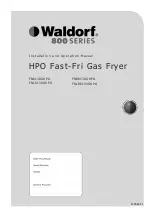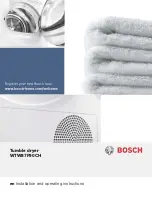
8
SECTION III
INSTALLATION PROCEDURES
Installation
should be
performed by competent technicians in accordance with local and state codes. In the
absence of these codes, the installation
must conform
to applicable American National Standards: ANSI Z223.1-
LATEST EDITION (National Fuel Gas Code) or ANSI/NFPA NO. 70-LATEST EDITION (National Electrical
Code) or in Canada, the installation
must conform
to applicable Canadian Standards: CAN/CGA-B149.1-M91
(Natural Gas) or CAN/CGA-B149.2-M91 (Liquid Propane [L.P.] Gas) or LATEST EDITION (for General
Installation and Gas Plumbing) or Canadian Electrical Codes Parts 1 & 2 CSA C22.1-1990 or LATEST EDITION
(for Electrical Connections).
A. UNPACKING/SETTING UP
Remove protective shipping material (i.e., plastic wrap and optional shipping box) from dryer.
IMPORTANT:
Dryer
must be
transported and handled in an upright position at
ALL
times.
The dryer can be moved to its final location while still attached to the skid or with the skid removed. To unskid
the dryer, locate and remove the four (4) bolts securing the base of the dryer to the wooden skid. Two (2) are
at the rear base (remove the back panel for access), and two (2) are located in the bottom of the lint chamber.
To remove the two (2) bolts located in the lint chamber area, remove the lint door.
With the skid removed, to make it easier to slide the dryer into its final position, slightly lower
ALL
four (4)
leveling legs, so that the dryer will slide on the legs instead of the base frame.
To increase bearing life and improve efficiency, the dryer
should be
tilted slightly to the rear.
1. Leveling Dryer
The dryer is equipped with four (4) leveling legs, one (1) at each corner of the base. Two (2) are located
at the rear of the dryer base, and two (2) are located in the lint chamber (coop). To increase bearing life
and improve efficiency, the dryer
should be
tilted slightly to the rear.













































